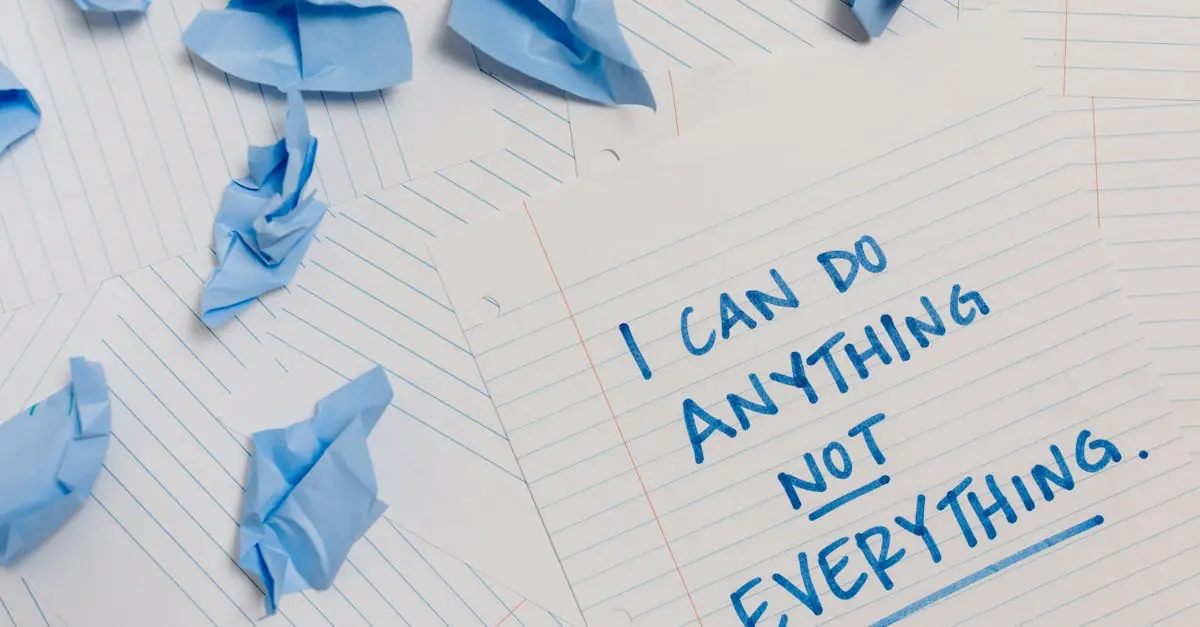Failure. It’s the uninvited guest at the party of success, showing up unannounced and often leaving a mess behind. But what if that mess is actually a treasure map leading to resilience? Embracing failure is like learning to ride a bike; you might fall a few times, but each tumble teaches you how to balance better for the next ride.
Table of Contents
ToggleUnderstanding Resilience Through Failure
Resilience represents the capacity to adapt and persevere in the face of challenges. Embracing failure fosters growth, emphasizing its importance in building mental toughness.
Definition of Resilience
Resilience refers to the ability to recover quickly from difficulties. It encompasses mental, emotional, and psychological strength in overcoming obstacles. Individuals with resilience adapt their strategies when faced with setbacks. They maintain a positive perspective, viewing challenges as opportunities for growth. Resilience can develop over time through experiences and deliberate practice. It often involves a willingness to learn from mistakes, reinforcing the concept that failure is not a permanent state.
The Role of Failure in Personal Growth
Failure plays a crucial role in personal growth by providing learning opportunities. Each setback serves as a lesson that guides future actions and decisions. When faced with defeat, individuals can reevaluate their approach, adjusting their strategies for better outcomes. The discomfort of failure often fosters self-reflection, prompting individuals to cultivate new skills. Taking risks leads to valuable insights that fuel resilience. Building resilience requires confronting failure head-on, transforming adverse experiences into stepping stones toward success.
The Psychology Behind Resilience
Understanding the psychological components of resilience reveals how individuals respond to failure and challenges. Two key factors contribute significantly: mindset shifts and emotional regulation.
Mindset Shifts
Adopting a growth mindset transforms the perception of failure. Individuals who embrace this mindset view setbacks as opportunities to learn rather than as insurmountable obstacles. They focus on the process rather than the outcome, recognizing that skills develop through experience. Each failure becomes a stepping stone, encouraging experimentation and creativity. This shift builds confidence, promoting resilience in future endeavors. Research shows that a growth mindset correlates with persistence in the face of challenges, motivating individuals to pursue their goals despite setbacks.
Emotional Regulation
Effective emotional regulation enhances resilience. It involves recognizing and managing emotions that arise during difficult situations. Individuals who successfully regulate their emotions often employ techniques such as mindfulness and cognitive restructuring. These techniques help them stay grounded and focused under pressure. By maintaining emotional balance, they can assess situations more clearly and respond constructively rather than reactively. Studies indicate that strong emotional regulation leads to better coping strategies, enabling individuals to navigate failures with greater ease and emerge resilient.
Benefits of Embracing Failure
Embracing failure provides significant advantages. Understanding these benefits can enhance personal growth and resilience.
Learning Opportunities
Learning arises from failure’s experience. Each setback offers insight into what didn’t work, guiding future decisions. Analyzing mistakes reveals patterns and improves problem-solving skills. Seeking feedback post-failure fosters insights that enhance capability. This process cultivates a mindset focused on growth rather than avoiding mistakes. By treating every failure as an opportunity, individuals can continuously evolve.
Strengthening Character
Strengthening character is a key benefit of facing failure. Each challenge builds perseverance and determination. Resilience develops through navigating difficult circumstances, resulting in greater emotional fortitude. Individuals who confront their failures often develop empathy and humility. This growth fosters stronger relationships both personally and professionally. Creating a resilient character allows individuals to approach future challenges with confidence, prepared to learn and adapt.
Strategies to Build Resilience
Building resilience involves specific strategies that promote growth and recovery from setbacks. Embracing these strategies fosters a stronger approach to adversity.
Cultivating a Growth Mindset
Adopting a growth mindset encourages individuals to view challenges as opportunities for learning. By recognizing that abilities can improve through effort, they become more willing to take risks despite potential failures. Emphasizing effort rather than inherent talent helps reshape the perception of failure. Each setback turns into a chance to develop new skills and insights. Viewing failures as stepping stones to success enhances motivation and persistence. This mentality transforms obstacles into learning experiences.
Practicing Self-Compassion
Self-compassion plays a crucial role in building resilience. Being kind to oneself during tough times fosters emotional strength and recovery. Acknowledging that imperfection is part of the human experience reduces feelings of isolation. It encourages individuals to respond to failures with understanding rather than criticism. Practicing self-compassion involves recognizing one’s feelings and treating oneself as a supportive friend would. Developing this mindset helps individuals bounce back more effectively, allowing them to learn from mistakes and move forward with confidence.
Real-Life Examples of Resilience Through Failure
Resilience often shines through in real-life scenarios where individuals face setbacks yet emerge stronger. Various stories highlight the transformative power of overcoming failure.
Inspiring Stories of Recovery
J.K. Rowling faced numerous rejections before publishing Harry Potter. Despite struggling with poverty, her determination led to unprecedented success. Thomas Edison’s journey exemplifies resilience; he famously stated that he found thousands of ways that didn’t work before inventing the light bulb. Each refusal and failure inspired him to innovate further. Oprah Winfrey’s early career involved significant challenges, including a difficult upbringing and job losses. However, she used these experiences as stepping stones, ultimately becoming a media powerhouse and an advocate for others.
Lessons Learned from Setbacks
Failures impart crucial lessons that facilitate growth. Michael Jordan didn’t make his high school basketball team, yet he used this setback to fuel his commitment to practice harder. His determination shaped him into a basketball legend. Similarly, Steve Jobs’ removal from Apple served as a critical turning point. During his time away, he learned valuable leadership lessons, which contributed to his later success upon return. Every setback underscores the importance of reflection and adaptation, urging individuals to identify weaknesses and develop stronger strategies.
Embracing failure is a powerful catalyst for personal growth and resilience. By reframing setbacks as opportunities to learn individuals can cultivate the mental and emotional strength needed to navigate life’s challenges. The journey through failure not only enhances problem-solving skills but also fosters a deeper understanding of oneself.
Real-life examples serve as a testament to the transformative nature of resilience. Each story highlights the importance of perseverance and adaptation in the face of adversity. Ultimately, the lessons learned from failure pave the way for future success, reinforcing the notion that resilience is not just a trait but a skill that can be developed over time.








